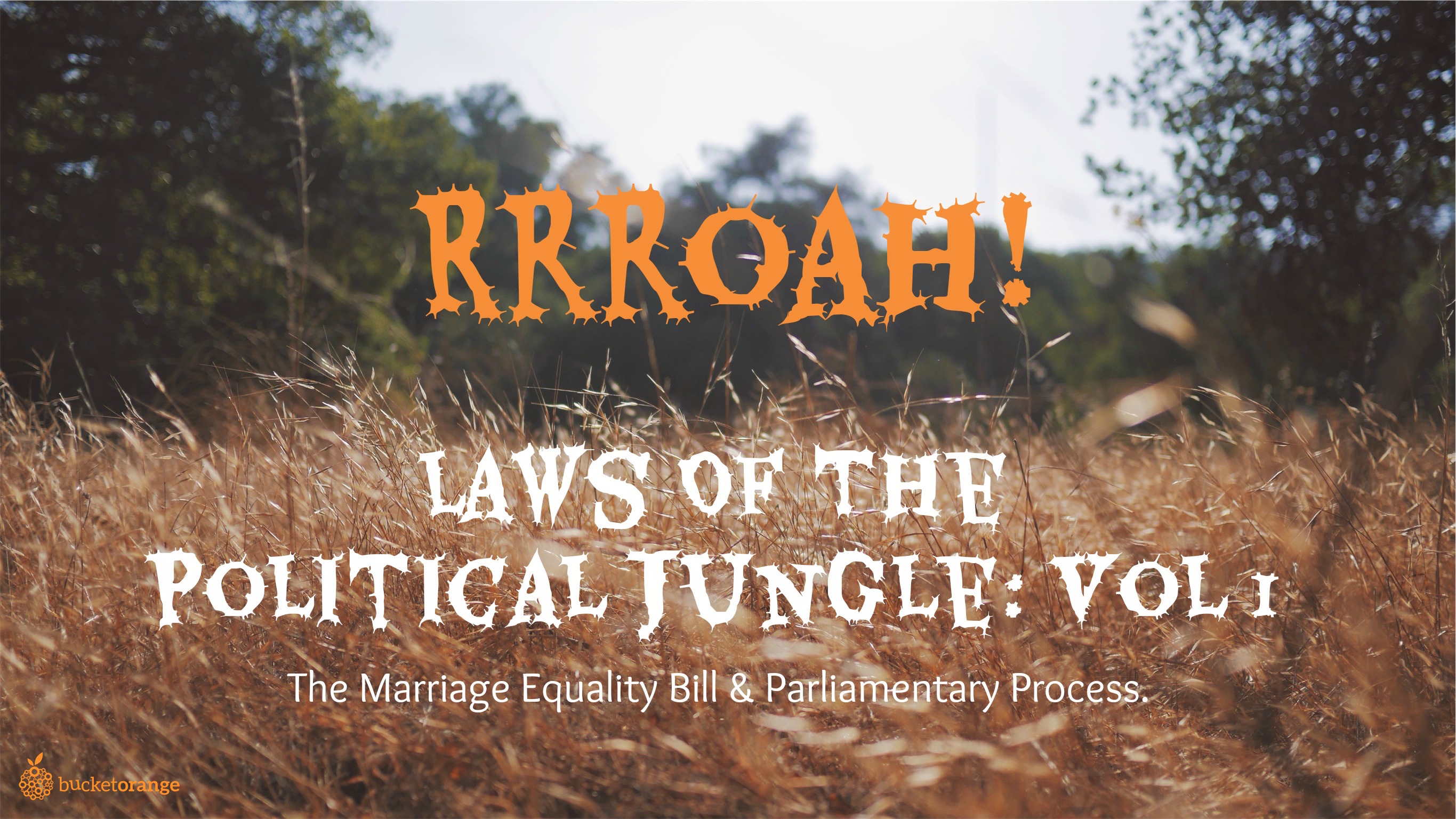
To everyday Australians, the inner workings of Parliament House can seem complex and confusing.
When it comes to making Australian laws:
- what role do politicians play in the life cycle of a Bill?
- what rules govern whether a proposed Bill lives or dies?
- how are laws actually made?
In the first of our Laws Of The Political Jungle series, we provide a simple snapshot of Parliamentary processes and some of the main obstacles faced by a proposed new Bill, such as the Marriage Equality Bill, being made into Australian law.
Parliamentary Safari
To better illustrate the factors that influence the survival of a Bill on its journey through an, often perilous, Parliamentary landscape we take you on a guided tour through equally wild terrain.
In this setting you have two groups of predators:
1) Lions which live in the open savannah of the House of Representatives; and
2) Crocodiles which reside in the water hole of the Senate.
In the middle of these two groups of politicians is a young zebra which represents a proposed new Marriage Equality Bill. If the young zebra is introduced into the House of Representatives, the zebra must safely travel past the first group of lions, and survive the group of crocodiles on the other side, if it is to become part of Australian law.
If the zebra is introduced into the Senate, the process is vice versa. In any event it may have to become an amended zebra for it to safely pass to become part of Australian law.

Survival Of The Fittest – Challenges Faced By A New Bill
In recent weeks there has been a lot of interest surrounding the Marriage Amendment (Marriage Equality) Bill 2015 (the Bill). On Monday this week (1 June 2015), the Marriage Equality Bill was introduced into the House of Representatives by Opposition Leader, the Hon. Bill Shorten MP, with the purpose of allowing same sex marriage in Australia.
To introduce the Marriage Equality Bill into a fertile grassland such as the House of Representatives, or alternatively the source of life-giving water in the Senate, is one thing – to have it navigate both Houses of the Parliament, be given the Royal Assent by the Governor-General and become part of Australian law is an entirely different matter.
Due to the current political climate, the House of Representatives has voted to postpone debate on the Marriage Equality Bill until later in the year. This means that it is unlikely that the Bill will be considered again until Parliament’s Spring Sitting (between August and December 2015).
Of considerable interest is whether the vote for each member of the House of Representatives (Member) and each Senator should be one of “conscience“. We will also explore the meaning of the phrase to “cross the floor”. To Members and Senators such a matter could be career defining for them to do so.
Top End Predators: Members Of The House Of Representatives & Senators
Before exploring the dynamics impacting a Bill’s survival, it is important to understand the law of the land as it relates to the placement of Members and Senators at the top of the food chain. This is called the Australian Constitution.
The Constitution is a bit like Mother Nature: it is not only a great source of power over the legal landscape but also has ramifications for politicians as a result of their behaviour, how they interact with one other as well as informing their subsistence strategy (continued election by the voting public). Without the Constitution, the House of Representatives and the Senate would not exist.
Given the importance of political parties in the history of Australian politics, it is somewhat surprising that there is no mention of them in the Australian Constitution, apart from what is to occur to fill the place of a Senator where a casual vacancy occurs by the Parliament of the State in which the vacancy occurred. The House of Representatives is composed of Members directly chosen by the people of the Commonwealth.
Lions On The Grasslands – Members of the House of Representatives
The Commonwealth Electoral Act 1918 (Electoral Act) provides the mechanism for the creation and re-distribution of Electoral Divisions for the House of Representatives. One member of the House of Representatives is chosen for each Electoral Division. Currently there are 150 Electoral Divisions in Australia, meaning there are 150 Members of the House of Representatives. In the event of a vacancy a writ must be issued for the election of a new member.
Each pride of lions, for example, has a unique leader who is responsible for looking after the interests of the group and its territory.

The pride of lions is the equivalent of each political party in the House of Representatives. The unique leader of the largest pride, or coalition of the largest prides, is the Prime Minister and leader of the next largest pride is the Leader of the Opposition, as constituting the largest prides of lions in the savannah. There are other smaller prides, or individual lions, living in the savannah.
The government is formed by the largest party or coalition of parties with the majority of Members in the House of Representatives. That party or coalition of parties may be in the minority in the Senate.
A political party may have both lions and crocodiles as its members, and certainly will do so if they are the party or parties forming the government and the opposition in the savannah.
Crocodiles In The Water Hole – Senators of the Senate
The Senate is composed of Senators for each State, directly chosen by the people of that State, voting as one electorate. If the place of a Senator becomes vacant before the expiration of the term of service, special provision is made for action by the Parliament of the relevant State for filling that vacancy by the member of the same political party.
The Electoral Act also makes provision for the election of Senators from the Australian Capital Territory and the Northern Territory, and for the filling of any vacancy by their respective legislative assemblies. There are currently 12 Senators from each State, and 2 Senators each from the Australian Capital Territory and the Northern Territory, with a total of 76 Senators.
If one crocodile unexpectedly leaves the water hole, for example, another crocodile will take its place in the bask.

Each bask of crocodiles, for example, has a unique leader who is responsible for looking after the interests of the group and its territory in the water hole. Each bask of crocodiles is the equivalent of each political party in the Senate. The unique leader is Leader of the Government in the Senate and the leader of the next bask is the Leader of the Opposition in the Senate. They are the leaders of the biggest bask of crocodiles in the water hole. There are other smaller basks, or individual crocodiles, living in the water hole.
Fit To Qualify – What Rules Guide Members And Senators In Their Natural Habitat?
Just like lions are adapted to life on land, so too Members of the House of Representatives must possess certain qualities in order to live in their environment. The same rules apply to crocodiles which are best suited to an aquatic existence in the same way that Senators need specific qualities to successfully live in the Senate.
There is no requirement for a member of a political party to be qualified to stand for election even though, a quick glance at the current list of Members and Senators, tells the story of how difficult it is for a person to be elected unless they are a member of a political party.
What Rules Determine If A Member Or Senator Can Be Disqualified?
Just as the laws of nature determine whether lions or crocodiles cast out certain individuals for social deviance (for example, where younger males challenge an alpha), The Constitution governs when a Member or Senator can become disqualified from their position in public office.

If a Member or a Senator is disqualified, as provided for in the Constitution, their place automatically becomes vacant. Crucially, it is not considered a disqualification for a Senator or a Member if they are expelled from membership, or disciplined by, their current or former political party.
There are also mechanisms for a Member or a Senator to be disqualified by the High Court of Australia, sitting as the Court of Disputed Returns under the Electoral Act. Being expelled from a political party or being disciplined is also no basis for disqualification under the Electoral Act.
Can Politicians Be Disciplined For Voting A Certain Way?
When an individual lion or crocodile misbehaves or contravenes group social norms, that individual could face an attack or social isolation.
Similarly, where a Member or Senator votes in a way that is contrary to their political party policy, they may be expelled from membership of that political party, or disciplined by that party. This does not result in disqualification from continuing to be a Member of the House or a Senator. That Member or Senator may choose to resign from the House or the Senate as the case may be, but they are not compelled as a matter of law to do so.
Bucking The Trend – How Does A “Conscience Vote” Impact A Bill’s Passage?
In recent weeks, there has been considerable discussion by politicians, the media, and the community as to whether members and Senators should have a conscience vote in relation to marriage equality that is the subject of the Marriage Amendment / Marriage Equality Bill 2015.
A “conscience vote” means that there will be no direction by the leader of each parliamentary party, of which they are a part of, to the Member or Senator to vote in any way on the Marriage Equality Bill. That is, it is a matter entirely for them to determine the way that they vote, and to deal with the politics of the way they voted as a result. As there will be no formal sanction, Members and Senators from the same political party may be voting differently from some of their colleagues.

This means that each lion and each crocodile can set aside group social protocols and choose to either attack the zebra or let it pass through their respective territories unharmed.
Zebra Crossing – What Does It Mean To “Cross The Floor?”
“Crossing the floor” is voting against the formal decision of the parliamentary political party to which the Member or Senator belongs.

Some political parties may not require a Member or Senator to vote in a particular way but some do have that requirement.
Where that is a requirement, every Member or Senator of that political party is required to vote in a particular way on a particular matter. For a Member or Senator not to vote in a certain way, if required to do so, is an unmistakeable and public act of rebellion.
Tracking The Zebra’s Spoor – The Parliamentary Procedures For A Bill
For any Bill introduced into the House, provided that it is important enough to have had sufficient time allocated to enable it to be debated, there will be a vote at the end of the second reading debate. For a question to be resolved in the House a vote must be taken. The Speaker or a Deputy Speaker will be the Chair at that time. The Chair will put the question that the bill be now read a second time. The Chair will call for those in favour to say aye and those opposed say no, and will state that he or she thinks that either the ayes or the noes have it. If that occurs and if two or more Members do not dispute that statement of opinion by the Chair then the vote is decided in favour of the ayes or the noes as the case may be. If two or more Members dispute that statement the Chair will ask if a division is required. A division is a formal parliamentary vote.
If a division is required by two or more Members, the Chair instructs the Clerk “to ring the bells”. Bells will be rung throughout Parliament House and every clock will have a flashing green indicator light on, for 4 minutes, to enable those Members who are required by their party to vote to enter the chamber. It is not unusual for Members to be scurrying along the corridors to get into the chamber prior to the time having elapsed – it is that important to them! Once the bells have stopped ringing, on the order of the Chair all of the doors in the chamber are locked. The Chair will then state the question to be decided and the vote of those Members present will be taken. Any Member who is not in the chamber when the doors are locked cannot vote on that question.
Those Members in favour of the Marriage Equality Bill being read a second time will sit on the right hand of the Speaker’s Chair and those opposed will sit on the left side of the Speaker’s Chair. If a Member “crosses the floor” then they will literally be seated on the opposite side of the chamber from their parliamentary colleagues, who will vote in accordance with their parliamentary party’s direction. That situation will remain until the procedural matters to enable the vote to occur are completed, and the number of votes on each side and whether or not the question has been agreed to has been announced by the Chair.
The names of each Member who voted in that division, and the way they voted, are recorded in the Hansard of the House of Representatives for that day, and will permanently remain. If a Member voted against what their parliamentary political party decided, that Member has crossed the floor regardless of the outcome of the vote.
The End Of The Road
If the majority of lions in the House of Representatives decide to attack the young zebra, by voting in the negative, the zebra will die. By denying the Marriage Equality Bill a second reading, and opportunity for the zebra to move on to the water hole, means that the Bill has not been passed by the House of Representatives and cannot be introduced into the Senate. In other words, once Members of the House of Representatives have voted in the negative on whether a Marriage Equality Bill should be read a second time, this is the end of its journey through Parliament and it cannot become law.

Since the life of this particular zebra is over, any further attempt for the same animal to be revived and to pass through the grassland or the water hole is not possible. A new Bill, on the same subject matter, would need to be introduced either into the House of Representatives or Senate and the whole process would need to start over.
NB: Materials from this article have been drawn generally from Info sheets and other publications on the Australian Parliamentary website. For a more detailed analysis of these issues, you can refer to Info sheets and other publications on the Australian Parliamentary website.
 Agree? Get informed about legal change that impacts you with our newsletter. You'll automatically receive fresh content each time we publish.
Agree? Get informed about legal change that impacts you with our newsletter. You'll automatically receive fresh content each time we publish.